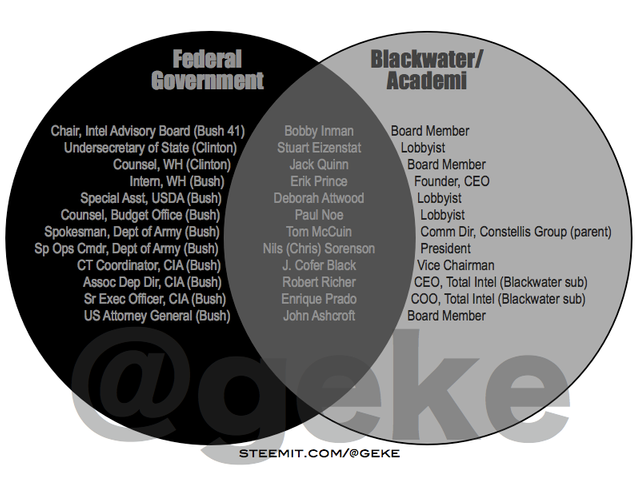The mercantilism behind Erik Prince's vision of private security forces

Recently, it's been reported that Erik Prince, the founder and former CEO of Blackwater, was approached by “Arab officials” regarding the possible creation of an Arab security force in Syria. Prince has already helped the UAE and Somalia launch private forces, and just last year Prince wrote in a Wall Street Journal editorial that the US plan in Afghanistan should be patterned after the British East India Company, a firm with its own private army.
Privatizing military forces may sound like a capitalist idea, but the British East India Company was hardly a capitalist venture. State-sponsored companies with their own private armies illustrate the economic definition of mercantilism.
Let's look at the difference between these three -ism's:
capitalism
– a competitive, savings-based system where resources and profits are held back from consumption to be saved for future productioncorporatism
– attempting to establish monopolies via the collusion of private corporations with the public government agencies that govern themmercantilism
– creating a “favorable balance of trade” which means maximizing a nation's exports to draw gold in as payment, and limiting imports by taxing them with tariffsMercantilism was the economic impetus behind most European imperialism. This was because the economist theorists of the time didn't realize wealth could be created. Instead, they believed the world's amount of wealth was held static in the amount of the world's bullion.
But if you think mercantilism died out with the Victorians, think again. Trump's recent steel and aluminum tariffs are prime examples of modern-day mercantilism. While the British East India Company was after spice, tea, and opium, however, a mercantilist firm established in either Afghanistan or Syria would exist for only one resource: oil.
Here's how Investopedia describes typical mercantilism:
“By the beginning of the 16th century, European financial theorists had begun to understand the importance of the merchant class in generating wealth. Cities and countries with goods to sell thrived in the late middle ages. It was argued that the state should franchise out the leading merchants in promising industries to create exclusive monopolies and cartels. These monopolistic corporations were to be controlled by the government and act as an arm of government interests. In return, the government would use regulations, subsidies and, if needed, military force to protect the corporation from domestic and foreign competition... The most famous and powerful mercantilist corporations were the British and Dutch East India Companies. The British East India Company had the exclusive, royally granted right to conduct trade between Britain, India, and China for more than 250 years. Its trade routes were protected by the Royal Navy and its high-ranking members became very influential in determining British foreign policy."
According to Trudy Rubin, writing for the Philadelphia Enquirer, Trump has expressed interest in Afghanistan's unexplored mineral resources and she calls Trump's foreign policy a "mercantilist approach."
So will Erik Prince's vision win out with the Trump administration? Prince is no longer financially connected to Blackwater (now Academi), but its venn shows several well-established connections with Bush administration officials in the military and CIA that likely receive favor from friends in government. Erik Prince, himself, is the brother of Trump's Education Secretary, Betsy DeVos. The question isn't if but when, and if Arab or US officials will be the first to finance Prince's mercantilist vision.

GekeVenns originating on Steemit
are regularly shared on the following platforms:
Facebook Profile: (930 friends)
Facebook Page, Exposing Progressive Corporatism: (4,200 followers)
LibertarianArts and GekeEconMeme Twitter accounts: (350 followers)

Great dig @geke! This compliments @fortified's piece very well.
I dont like the idea of these mall cops being a third world nations police or military
To listen to the audio version of this article click on the play image.

Brought to you by @tts. If you find it useful please consider upvote this reply.
syria is one of the muslim country.but the situation of this country is not good.everyone pray for this country.keep sharing.thank you.go ahead on your way
Amazing article @geke :D
I cannot seem to find you on twitter!
Three reads that reveal
Erik Prince is pure evil.
Hey good stuff. All these private government contractors and security firms are so incestuous and insidious af.